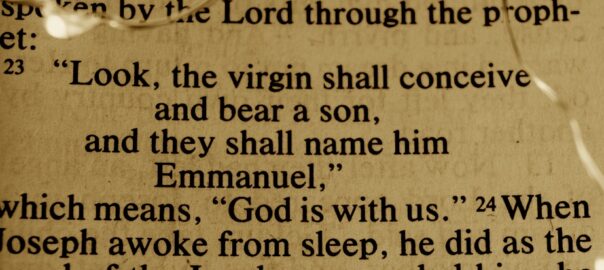
Christmas is the Christian celebration of the birth of Jesus of Nazareth, who is proclaimed by the faithful as the Prince of Peace and Savior of the World. The hopes of Israel are embodied in an heir of David who will be King and bring deliverance, healing, and restoration (See Matthew 1-2 and Luke 1-2). We are familiar with the humility of Mary and Joseph, the humble setting of the birth, shepherds receiving angelic visitations, and, eventually, Magi coming to worship a toddler Jesus in his home. May we nourish these thoughts forever.
But there is something even deeper about Christmas that can be lost in the familiar festivities. Christmas is the great moment of divine humility: The eternal Son, “God of very God, Light from Light, begotten, not made…” (from the 4th century Nicene Creed) assumes human nature and enters our history. Michael Card expressed this profound truth so well: “Behold the mystery fantastic and wild; a Mother made by her own Child.” The Eternal steps into time. The Infinite assumes finitude. The Holy One becomes forever human. This is why Matthew 1:22-23 declares that Jesus is Immanuel, which translated literally, means, the “With-Us-God.”
Jewish scholars were stunned by Jesus. On one hand, he was hailed as the Son of David, the Messiah coming to liberate God’s people. Yet Jesus chose a path of healing over violence, deliverance over despotism, inclusion of outsiders over catering to the elites. Jesus’ humility, powerful teaching, and miracles won him many followers. But Jesus was more than an expected King: he declared himself one with the Father and assumed divine attributes reserved only for the One True God: forgiving sin, receiving worship, and declaring his understanding of Scripture the final and full word. For the Jews, this was blasphemy and the unity of the Father and Son was impossible, for God is One. And this oneness is absolute, with no room for rivals.
As Christianity spreads beyond Judaism and welcomes converts from Greek and Roman philosophies and religions, the idea that Ultimate Truth could assume human nature was deemed illogical and impossible. After all, the soul was trapped in the material body and that which is perfect could never be contained in flesh. This dualism would later infect Christian thinking, with unfortunate consequences. Popular religion in Rome had a place for many gods, but Christians refused to bow to any other lords or gods other than the Eternal God revealed in Jesus, who is Lord and the Christ. So Greek dualism and Roman polytheism were rejected in favor of the adoration of the Father, the Son (Jesus of Nazareth) and Holy Spirit.
Let’s come back to divine humility. In Jesus, God is forever one of us! What an affirmation of being human! Jesus’ experience was just as ours, though without the sin that ruined our first parents and continues subverting our lives. Jesus developed from a child to an adult, faced all our temptations, experienced our emotions, knew physical fatigue and limitations, and enjoyed life with friends and family. His crucifixion was excruciating. On the Cross he carried our sins and sorrows, sufferings and unanswered questions. His bodily resurrection on Easter offers a preview of the eternity for all believers: our future includes embodied work and play, community and worship. Jesus is forever one of us. If we could somehow have Scotty (of Star Trek fame) beam us to heaven, we would be able to touch Jesus, for even as the glorified Lord, he is one of us.
This Christmas, let’s allow divine humility to heal us from inferiority or inadequacy arising from our past and the abuses and rejections we remember so well. We are worth God forever becoming human. We are worth the painful and unjust death of the Cross. We have a vision of our future on Easter. With God’s help and the support of many around us, we can walk in confidence and hope, for we have welcomed Immanuel into our lives.

